The tight labor market that the promotional products industry experienced in the immediate aftermath of COVID-19 has seemingly softened for some firms and remained arduous for others.
In a survey of 2023 PPAI 100 distributors and suppliers, the top hiring challenges cited represent a three-pronged set of obstacles that drive home the importance of employee retention. In many cases, keeping good employees happy is more desirable than facing the labor market.
Nearly two-thirds (65%) of distributors reported a shortage of skilled candidates as their top hiring challenge, indicating a significant gap in the talent pool (see Figure 1). Almost half (47%) reported heavy competition for talent, and more than one-third (35%) cited budget constraints for offering competitive salaries.
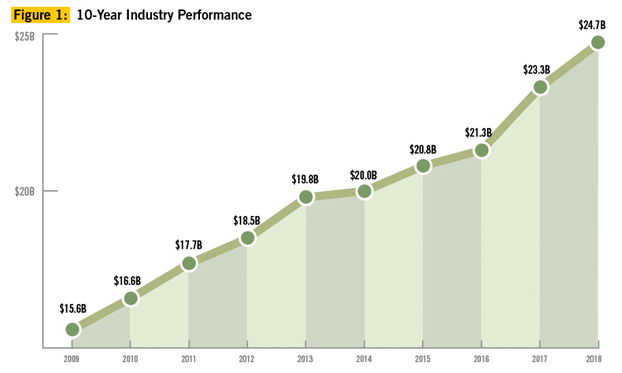
Interestingly, 2023 PPAI 100 suppliers aren’t reporting the common hiring challenges at quite as high a rate as their counterparts, despite the fact that PPAI Media’s bi-monthly business survey reported that suppliers faced more revenue struggles than distributors in February and March.
One anonymous PPAI supplier even stated: “We don’t have hiring challenges. We have more qualified applicants than we need.”
The most cited challenge (46%), however, remains a shortage of skilled candidates. This is followed by budget constraints for competitive salaries (38%) and high competition for talent (35%).
“The promotional products industry faces multifaceted hiring challenges, from the scarcity of skilled talent and fierce competition to financial limitations and procedural inefficiencies,” says Alok Bhat, market economist and research lead at PPAI.
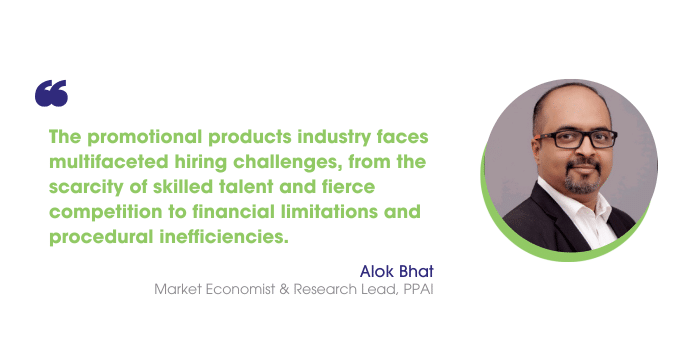
“Addressing these issues requires innovative recruitment strategies, competitive positioning and possibly a reevaluation of hiring practices to navigate the complexities of the current talent landscape effectively.”
A Particular Set Of Skills
One anonymous supplier stated that their company was often hiring outside of the industry in search of more sophisticated skill sets, particularly when it comes to customer relationship management knowledge.
Conversely, Alpharetta, Georgia-based distributor North Georgia Promotions hasn’t set any kind of limitations on the recruitment process and is still coming up empty. “We’re not just looking for skilled labor,” says Adam Campbell, MAS, director of operations at North Georgia Promotions. “We’re willing to train people, but we’re still having issues with hiring.”
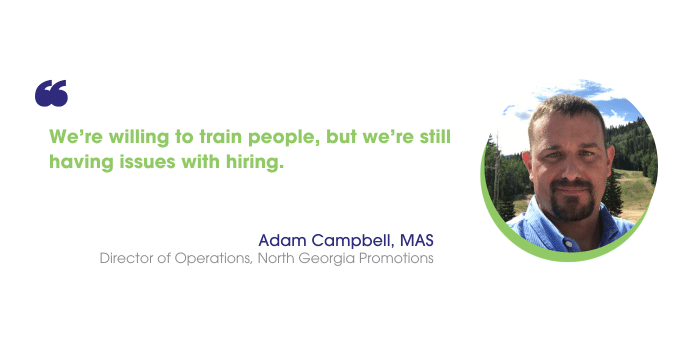
Even though the industry has moved on from the pandemic, some firms haven’t responded as well to its lingering effects. For example, adapting to virtual recruitment practices poses a challenge for 29% of distributors, with one anonymous respondent lamenting having to “sift through the flood of virtual applications” coupled with applicants often “ghosting interviews.”
Bhat contends that these challenges are a sign of the progress the industry is making in technological advances and ambitious initiatives, which inevitably can require a professional with a certain expertise rather than a jack of all trades.
“High competition for talent underscores the intense battle to attract top professionals, further exacerbated by the industry’s rapid evolution and demand for innovative skill sets,” Bhat says.
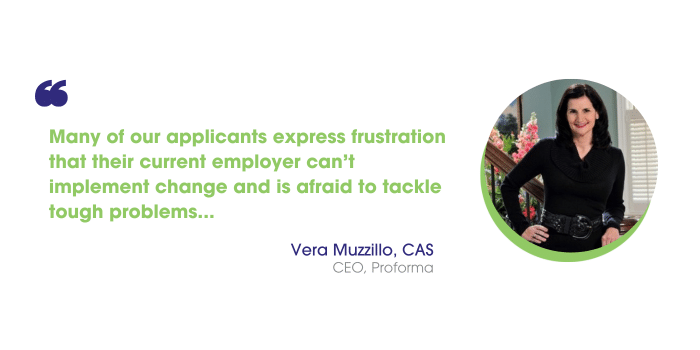
Of course, not everyone is struggling to fill positions. Proforma – the No. 3 distributor in the 2024 PPAI 100 – is currently flush with applicants primarily from within the industry, according to CEO Vera Muzzillo, CAS.
“Many of our applicants express frustration that their current employer can’t implement change and is afraid to tackle tough problems, causing them stress in their jobs,” Muzzillo says. “Meanwhile, we’re nimble, dedicated and stacked with incredibly smart and talented executives who know how to create positive change, solve the toughest problems and work together to raise everyone up.”
How Promo Finds Top Talent
Combating these challenges requires a diverse set of hiring strategies and recruitment channels.
The most common way that suppliers (79%) and distributors (85%) claimed to find candidates was through job boards, such as Indeed and LinkedIn. Meanwhile, 85% of distributors also cited employee referrals, compared to 68% of suppliers (see Figure 2).
More than half (55%) of distributors and 39% of suppliers said recruitment agencies play a significant role in talent acquisition, indicating that many are willing to invest in professional services to find the right people for their company.

“The promotional products industry employs a diverse range of recruitment channels to source candidates, with a heavy reliance on digital platforms like job boards and social media,” Bhat says. “Employee referrals and professional recruitment services also play significant roles, reflecting a multifaceted approach to talent acquisition.”
Social media plays a far greater role in distributors’ recruitment strategy, as 50% use platforms like Facebook, X, Instagram and TikTok to advertise job listings and promote their brands. Only a quarter of suppliers reported doing so.
RELATED: The 2024 #Online18: Promo’s Best Organizations On Social Media
In another significant disparity, 45% of distributors, compared to 21% of suppliers, reported that their company website serves as the primary source for candidates. Furthermore, 20% of distributors cited college career fairs, as well as industry-specific events and trade shows, compared to just 7% of suppliers (see Figure 3).
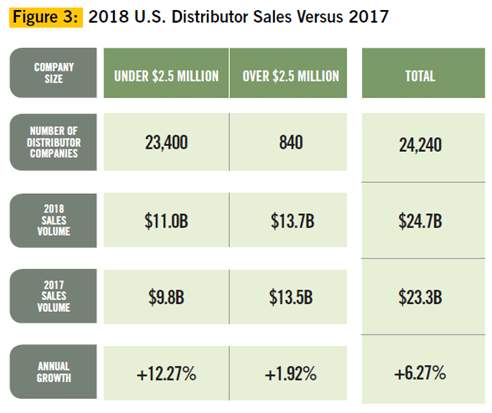
Future Of Work Strategies
As employees are being recruited from other industries, most distributors (90%) and suppliers (81%) reported investing in employee training and development (see Figure 4), showcasing a strong commitment to enhancing workforce capabilities and adapting to future demands.
Meanwhile, most suppliers (89%) and distributors (80%) claimed to be investing in fostering a culture of innovation and flexibility, supported by 26% of suppliers and 50% of distributors citing investments in strengthening their remote work infrastructure.
“In charting the course for the future, the promotional products industry prioritizes cultivating a skilled, adaptable workforce through robust training, digital innovation and a culture that champions flexibility and creativity, ensuring readiness for tomorrow’s challenges and opportunities,” Bhat says.

Another evergreen investment is the enhancement of digital transformation initiatives, which 75% of distributors and 59% of suppliers claim to be focusing on (see Figure 5). Those statistics surprised Campbell, who assumed more PPAI 100 firms would be putting their money into digital transformation.
“When we’re struggling to hire, we have to get more done with less staff, and capitalizing on digital transformation has been the way to go,” says Campbell, whose company has been able to offset a vacant receptionist position with automated customer follow-ups for quotes and payments. He says relying on technology has had a huge positive impact on the business.
“You really do need to work smarter and not harder,” Campbell says. “Businesses also need to analyze their customer base and the bottom line to determine if they’re just busy being busy or busy being profitable. They’re not one and the same.”
Digital transformation can streamline hiring, workforce administration, training and both candidate and employee engagement, according to Anil Rath, HR digital transformation lead at Accenture, a global professional services firm.

“Enterprises adopting HR technologies and platforms have benefited by not only enhancing brand values, candidate experience, efficiency gains and their net promoter score, but also reducing time to hire, cost per hire, etc.,” Rath says. “Digitalization of processes helps free up capacity of HR professionals to focus on and perform value-added activities, such as relationship management and data-driven decision-making to remain competitive in the market.”
Rath urges promo firms to use artificial intelligence in the hiring process to help identify potential hires, as the technology analyzes historical data, relevant skills, experience and job descriptions to recommend top applicants. “AI helps augment our HR roles, enabling staff to focus on strategic activities wherein human decision-making and engagement is required,” Rath says.


